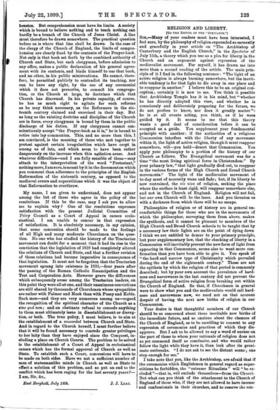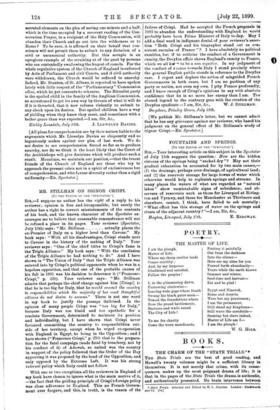RELIGION AND LIBERTY.
(To THE EDITOR OF TIIR "SPECTATOR."] SIR,—Many of your readers mast have been interested, I feel sure, by the philosophy of religion expounded so earnestly and gracefully in your article on "The Archbishop of Canterbury and the English Church," in the Spectator of July 15th, a theory which you use as a plea for liberty in the Church and an argument against repression of the mediwTalist movement. For myself, it has drawn me into more than a second reading of the article. The main prin- ciple of it I find in the following sentence : "The light of an active religion is always burning somewhere, but the inevit- able tendency is for that light to die away in one place and to reappear in another." I believe this to be an original con= ception ; certainly it is new to me. You think it possible that Archbishop Temple has it in his mind, but "whether he has directly adopted this view, and whether he is consciously and deliberately preparing for the future, we do not profess to know, nor does it greatly matter "; he is at all events acting, you think, as if he were guided by it. It seems to me that this theory wants a good deal of consideration before it can be accepted as a guide. You supplement your fundamental principle with another : if the authorities of a religious Communion interfere with the liberty of any movement within it, the light of active religion, though it must reappear somewhere, will—you hold—desert that Communion. You apply your philosophy to a portion of the history of our Church as follows. The Evangelical movement was for a time "the most living spiritual force in Christendom." By your primary law, " that light gradually died out, to reappear in the various forms of the High Church and Broad Church movements." The light of the meditevalist movement of to-day must of necessity wane and fade; but, if its liberty be now restrained, the via viva of religion, seeking the place where the surface is least rigid, will reappear somewhere else, and not in the Church of England. Religion will not fail, but our own Church will be the loser. And you threaten us with a darkness from which there will be no escape.
Philosophies of religion or of history are in general un- comfortable things for those who are in the movements of which the philosopher, surveying them from above, makes the synthesis, and it cannot be pleasant to members of the High Church and Broad Church schools to be taught that by a necessary law their lights are on the point of dying down I think we are entitled to demur to your primary principle, but your supplementary law, that the checking of liberty in a Communion will inevitably prevent the new form of light from appearing in that Communion, seems also to want more con- firmation than you have been able to give it. You speak of "the hard and narrow type of Christianity which prevailed during the end of the eighteenth century." Those are not the epithets by which the religion of that period is commonly described; but by your own account the prevalence of hard- ness and narrowness in the last century did not prevent the Evangelical form of active religion from breaking out within the Church of England. So that, if Churchmen in general were to show what you and the mediawalists would call hard- ness and narrowness now, we need not on that account despair of having the next new births of religion in our Communion.
Your desire is that thoughtful members of our Church should be so concerned about these inevitable new births of the immediate future, and so anxious about the chances of the Church of England, as to be unwilling to consent to any repression of ceremonies and practices of which they dis- approve. But I ask to be allowed to say a word of excuse on the part of those to whom your rationale of religion does not as yet commend itself as conclusive, and who would rather follow the light while they have it, than look after its proxi- mate outbreaks. "I do not ask to see the distant scene ; one step enough for me."
I take note that you, like the Archbishop, are afraid that if the ceremonies which Englishmen in general regard as super- stitions be forbidden, the "extreme Ritualists" will "be ex- cluded "—that is, will exclude themselves—from the Church. But what can you think of the attachment to the Church of England of those who, if they are not allowed to have incense and confessionals in their churches, and to reserve the con-
secrated elements on the plea of saving one minute and a half, which is the time occupied by a reverent reading of the Con- secration Prayer, to a recipient of the Holy Communion, will abandon their Church and go out into the wilderness or to Rome ? To be sure, it is affirmed on their behalf that con- science will not permit them to submit to any dictation of a civil or uncanonical authority. But this scruple is an egregious example of the straining at of the gnat by persons who are contentedly swallowing the hugest of camels. For the whole regulative system of the Church of England is enforced by Acts of Parliament and civil Courts, and if civil authority were withdrawn, the Church would be reduced to anarchy. Indeed, Mr. Stanton, of St. Albans, is reported to have spoken lately with little respect of the "Parliamentary" Communion office, which he yet consents to rehearse. The Ritualist party is the spoiled child in the family of the Anglican Communion, so accustomed to get its own way by threats of what it will do if it is thwarted, that it now refuses violently to submit to any check upon its desires. But spoiled children have a way of yielding when they know they must, and sometimes with a better grace than was expected.—! am, Sir, (Lc., [All pleas for comprehension are by their nature liable to the arguments which Mr. Llewelyn Davies so eloquently and so ingeniously makes against our plea of last week. We do not desire to see comprehension forced so far as to produce anarchy, nor do we think it the least likely that the Court of the Archbishops will give decisions which will produce such a result. Meantime, we maintain our position,—that the truest friends of the Church of England are those who try to approach the present crisis not in a spirit of exclusiveness but of comprehension, and who favour diversity rather than a rigid uniformity.—ED. Spectator.]



































 Previous page
Previous page